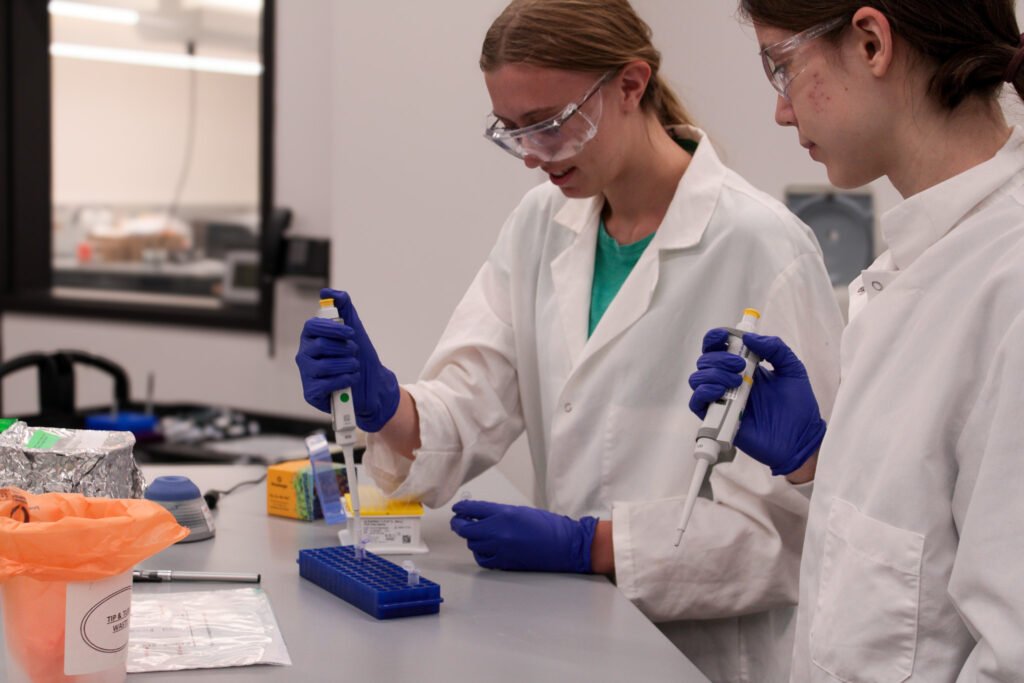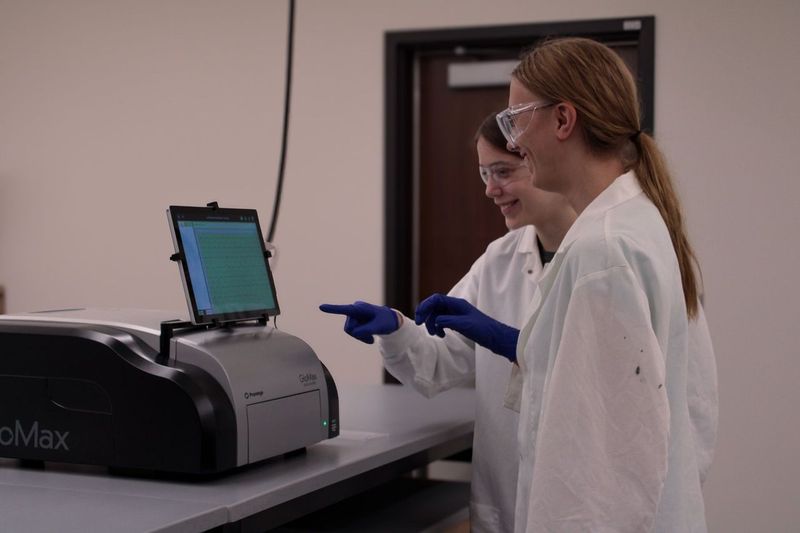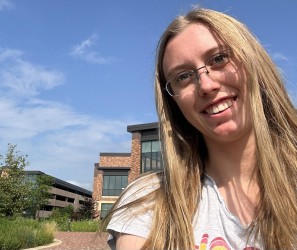
If she weren’t working at Promega, Evie Zadzilka probably would’ve spent the summer after high school graduation taking summer classes before reporting to her freshman year at the University of Wisconsin-Madison. She runs a small art business, and she might’ve spent more time taking commissions.
Instead, Evie spent the summer before college as an intern in Promega R&D, honing her pipetting skills as she learns about primer design and contributing to the development of a new Promega assay.
“I’ve had a great time,” she says. “I’ll definitely take a lot with me from this experience. I’m so glad I got to do it.”
Evie and her fellow intern Tess Clark were the two high school-aged interns placed at Promega through a relationship with a Madison-based nonprofit called Maydm. This organization helps girls and youth of color in grades 6-12 prepare for careers in STEM by providing educational opportunities and experiences. Through school and summer programs, they strive to disrupt systemic barriers by empowering students like Evie to pursue their dreams as entrepreneurs, developers, engineers and more.
“This will really boost my confidence when I get into lab work next year,” Evie says.
High School Internships at Promega

During their senior year of high school, Tess and Evie were both enrolled in dual-credit courses through Madison College. These classes made them eligible to apply for a high school internship through Maydm.
“I’ve been interested in research for a very long time,” says Tess, another recent school graduate preparing to enter the University of Wisconsin-Madison. “I’m going to major in physics next year, and I don’t have many ties to the biotechnology or chemistry I’ve worked with at Promega. But I wanted hands-on lab experience, so that’s how I ended up here.”
Both students worked with the R&D Flex Team, a diverse team that moves around Kornberg Center, contributing resources to high-impact projects. Tess was assigned to a protein purification project, learning techniques like column chromatography and running countless gels. Evie, a future genetics student, dove into forensic DNA analysis chemistry.
“I’ve gained experience using instruments like a thermal cycler and the Spectrum CE System, while also learning to consider things like what makes a good primer,” Evie says.
Lab experience grows skills beyond specific techniques. Evie and Tess attended journal clubs and presentations, getting immersed in complex science discussions. They gained a deeper understanding of lab safety and started to develop positive habits to maximize their effectiveness as scientists.
“One of the most helpful things is knowing what to write down,” Tess adds. “If something goes differently than planned, what’s okay and what’s important to write down? Do I need to know the lot number of the reagents?”
Evie and Tess also credit their respective supervisors with providing valuable mentorship. In addition to preparing them for each day’s lab activities, they talked about education and possible career paths.
“Amanda Marquard, my supervisor, has been amazing about explaining things starting from the most basic level,” Evie says. “Then, as I started to understand, she helped me understand how my work fit into the larger R&D project. She was great at teaching both the hands-on activities and the bigger, theoretical concepts.”
Supporting Students in STEM

Flex Team Supervisor Sarah Mahan started growing her team’s relationship with Maydm after networking with one of the organization’s leaders at the local ice rink. Soon after that, she brought a group of 30 students to tour Kornberg Center and work in the lab with BTC Institute teachers. She hosted her first Maydm interns 2023 and was excited to host more in 2024.
“If you can get kids in early, they can get a much better understanding of the options and opportunities that are out there,” Sarah says. “With information and access, suddenly they’re excited about careers in the biotech industry. That’s what we need.”
As Tess and Evie learned, Promega interns aren’t just given busy work or errands. They’re given real projects, with the potential to make an impact for their team, department, or research field. These opportunities help future scientists gain skills and confidence, empowering them to succeed as they pursue a career in science.
“This opportunity has really pushed me towards the world of R&D,” Evie says. “I love the community, and the collaborative trial-and-error aspect of research. When I look for jobs in the future, I’ll definitely be focusing on companies that value team building and development. I’m sure I’ll retain a lot of hands-on skills, but it’s the confidence and relationships that I hope will stick with me.”
